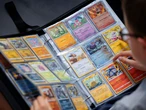The latest gambling scandal to rock the NBA is about a real-world event that normal people would never have noticed. In March 2023, the 35-37 New Orleans Pelicans coasted to a 115-89 win over the Charlotte Hornets, who would go on to finish the year with a record of 27-55. The Pelicans never trailed in the game thanks largely to the play of Brandon Ingram, who notched the first triple-double of his career.
The ninth paragraph of the recap on ESPN mentions one other factor that may have contributed to the decisive margin of victory: Hornets guard Terry Rozier left the game early, complaining of a sore right foot, and did not return.
As alleged by federal prosecutors in New York, this was not a coincidence. Before the game, they say, Rozier told a childhood friend that he intended to fake an injury, thus allowing that friend to place sure-thing wagers on Rozier’s props—a type of bet that allows users to gamble on whether a player will accumulate more (“over”) or less (“under”) than a sportsbook-supplied total in a given statistical category.
Rozier’s friend then sold this information to an uncertain-but-significant number of other bettors, who collectively bet hundreds of thousands of dollars that Terry Rozier, a serviceable-but-not-spectacular guard playing in a late-season game between two perennially forgettable teams, would just happen to have an off night.
Sure enough, Rozier checked out after scoring just five points in less than ten minutes of playing time, which meant that, as promised, those under bets hit. A few days later, the bettors convened in Philadelphia to settle up. Rozier’s friend then drove to Rozier’s home in Charlotte, where they counted their cash together, according to the indictment.
Prop bets—bets that a given event will or will not occur in a game—are not the only variety of cheating alleged in this scandal, which involves a cast of characters that includes current and former NBA players, enterprising sports gamblers, and Mafia associates running rigged poker games that will almost certainly be portrayed in a Netflix limited series sometime next year. But player props are at the heart of this story nonetheless, because player props will likely be at the heart of every sports betting scandal for the foreseeable future.
Props are the betting industry’s single greatest threat to the legitimacy of the games fans watch, and to the public trust the leagues spent decades building. Yet because their availability makes so much money for everyone involved—not bettors, of course, but the leagues and their official sportsbook partners—no one in a position of power has much of an incentive to do anything about it.
Among bettors, props are popular because they are fun: They give casual viewers a reason to root for players they otherwise wouldn’t care about, and take advantage of armchair quarterbacks’ fervent belief that they understand their favorite team’s tendencies better than some oddsmaker ever could. But from an integrity-of-the-game standpoint, the problems with these bets are pretty intuitive.
First, in many cases, the outcome is easily manipulable by one person. A player in Rozier’s shoes can’t guarantee that he’ll score a certain number of points, and he certainly can’t guarantee that the Hornets will win (or lose) the game. But he can guarantee that he scores less than a certain number of points. All he has to do is remember what that number is, and to grasp at his foot and wince a little before he reaches it.
Second, the outcomes of prop bets are often inconsequential to the final score, which is what most non-bettor fans pay attention to and care about. Earlier this year, for example, regulators flagged that bettors in Ohio, New York, and New Jersey seemed unusually confident that Cleveland Guardians pitcher Luis Ortiz, in two specific games and in two specific innings, would throw a ball or hit the batter with his first pitch. Sure enough, in both instances, Ortiz’s deliveries were outside and in the dirt; one skipped by the catcher altogether.
Major League Baseball placed Ortiz on leave, and its investigation is ongoing. But if Ortiz was colluding with friendly bettors whom he tipped off beforehand, it is easy to see how they might have settled on this particular moneymaking strategy, which hinges on the results of a single pitch, thrown when nobody is on base, while fans who went to get beers during the break are still making their way back to their seats.
Again, by himself, a player like Ortiz can’t control whether his team wins a nine-inning game. But he can control whether his first pitch of the third inning is anywhere close to the strike zone, or gets all the way to the backstop.
In the past year or so, the leagues have begun to understand the dangers that the proliferation of prop bets poses to their respective enterprises. Over the most recent MLB All-Star Break, Commissioner Rob Manfred criticized prop bets as “unnecessary” and “particularly vulnerable” to manipulation. At the NFL’s request, Illinois regulators banned props on made kicks, incomplete passes, and other events where the outcome is “100% determinable by one person in one play.” The NCAA has asked Congress to ban player props in college athletics; in Ohio, Governor Mike DeWine has pushed for a total ban on props in both college and pro sports, calling the market for these bets an “experiment” that has “failed badly.”
The NBA had the chance to address props last year, when Toronto Raptors reserve Jontay Porter was implicated in a Rozier-style scheme in which he removed himself from a game to ensure his under bets would hit. Shortly afterwards, NBA Commissioner Adam Silver asked sportsbooks to stop offering props on players who are, like Porter, signed to two-way or ten-day contracts, reasoning that fringe players making the least money are the most susceptible to pressure to try and supplement their incomes while they still have the chance.
But the Rozier scandal reveals the flaws inherent in trying to regulate a multibillion-dollar industry by reacting to the most recent scandal. First, the unavailability of props for players of Porter’s caliber would not have affected Rozier, a ten-year veteran who, when he pulled himself from that game back in March 2023, was in the first year of a four-year contract worth $96 million. And second, all Silver could do was ask the sportsbooks for help, because the league only has so much control over the bets its partners do and don’t take. As a result, according to NBC News, even after the Porter scandal, the league had to make the business case to the sportsbooks that prop bets on bit players like him were not lucrative enough to continue to offer.
It is true that leagues, sportsbooks, and regulators have procedures in place to try and ferret out cheating. Hours before the game from which Rozier removed himself, many sportsbooks stopped taking bets on his props after a third-party monitoring firm flagged unusual betting activity on his unders, including one bettor at one casino who wagered more than $13,000 across 30 separate bets in 46 minutes.
But the fact that these systems have caught some cheating only raises the question in fans’ minds of how much cheating is actually going on. If Rozier’s friend had been a little more circumspect about placing his bets—or, at the very least, if he hadn’t passed it on to God knows how many people who flooded gambling apps and casino floors, looking to get in on the action—perhaps no one would have found out.
And even if (a big if, but stay with me) these systems are as effective as leagues would like you to believe, perception is as important as reality. The more often that bettors read about scandals like this one in the news, the more often their lost wagers and bad beats will start to feel like the results of corruption that the leagues must have missed.
Already, players across sports endure harassment and receive death threats from bettors angry about a leg of their parlay that didn’t hit. If you search X for the name of any underperforming player in any given game, you will get a deluge of irate all-caps tweets concluding that the fix must be in, and snitch-tagging the FBI to beg Kash Patel to open an investigation immediately.
To date, the leagues have—pardon the phrase—bet that the billions of dollars they make from legal gambling will make the occasional embarrassing scandal worth the trouble. (Silver recently described the NBA as “learning as we go.”)
For now, that’s probably still true, but at some point, if betting and non-betting fans no longer trust the on-field, on-court, or on-ice product, it won’t be. The question is whether the leagues will give up some of this easy money to protect what remains of their credibility, or whether they are willing to risk losing it for good.










No comments